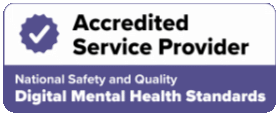Accessibility Tools
- Content scaling 100%
- Font size 100%
- Line height 100%
- Letter spacing 100%
Displaying items by tag: relationships
Helping
There are lots of simple, everyday ways you can support someone who has a mental illness. Small things can make a big difference: being there to listen, keeping in touch and reminding the person that you care. Another powerful way to help is to learn as much as possible about the illness and its treatment. This will help you communicate more knowledgably and effectively with the person you care for and any treating health professionals. You can also share this information with family and friends to help them to better understand and provide support.
Being a carer can make demands upon your own physical and mental health too. Make sure you speak out to other family members and health professionals, for example, and ensure you get the support you need.
Tips for being a carer
- Ask how you can help. People will want support in different ways at different times so asking is the best way to know how you can help. Sometimes people struggle to express what they need so making suggestions can also be useful.
- Give them time. Some people might prefer a text message or email rather than talking on the phone or face-to-face. This means they can get back to you when they feel ready. What’s important is that they know you’ll be there when they’re ready to get in touch. Others may prefer to hear a human voice, with a regular phone call instead.
- Try to be open-minded and non-judgemental. This can be hard with some of the behavioural changes associated with symptoms. For example, if someone starts staying in bed rather than meeting their responsibilities it can be tempting to attribute this to the individual rather than the condition. It is best to focus on how to deal with the symptoms rather than judge the behaviour alone.
- Encourage sticking to a treatment plan and make a crisis plan so that you know what to do if symptoms escalate.
- Remember you are not to blame if things get difficult and try not to take hurtful comments personally. Some mental health conditions may involve increased anger and irritability that can be difficult for the person to control. At the same time, aggression and violence are always unacceptable. Do not hesitate to call on help in these circumstances, even if this involves the police.
- Try to be patient. Getting better can take time.
- If you live together, setting out house rules can help. However, be sensitive to the fact that there may be times when keeping to those rules feels beyond the person’s ability.
- If you know someone has been unwell, don’t be afraid to ask how they are. They might want to talk about it or they might not. Letting them know they don’t have to avoid the issue can be helpful.
- Try to avoid clichés. Phrases like ‘Cheer up’, ‘I’m sure it’ll pass’ and ‘It could be worse’ won’t help and can make the person feel more isolated.
- Don’t just talk about mental health. Keep in mind that having a mental illness is just one part of a person's experience. People aren't defined solely by their health problems.
- Encouraging the person to do things without being unrealistic or demanding. For example, social contact is very important to our wellbeing and so encouraging outings and meetings with others can be helpful. Bear in mind this can sometimes feel daunting for someone affected by mental illness.
- Consider the person as a whole. Remember that they have the same range of personal, emotional and sexual needs as anyone else. Is their physical health being looked after by a GP? Are there alcohol or drug problems that needs attention?
- Many carers neglect their own needs because of their caring role. This doesn’t help you or anyone else in the long run. Look after your own physical and mental health, and talk to a health professional about what support is available. See What support is available for carers?
If you are concerned about your caring role or its impact on you, contact the SANE Help Centre on 1800 18 SANE (7263) for information, guidance, and referral for support.
Stay in touch
When you’re affected by mental health problems, other people can often be the best medicine. Making the effort to stay in touch with others makes you feel better, and can be a critical, even life-saving support.
Connect
With friends, family, and others
When affected by mental health problems, we often don't feel like mixing with other people. We avoid seeing friends and family as usual. We may even avoid going to work or attending appointments. Interacting with others can just seem too overwhelming and difficult. It feels easier to be on your own.
Isolating yourself from others will only make you feel worse, however, and can mean delay in being diagnosed and receiving treatment and support. Make an effort to see people as usual, even if only for shorter periods or in ways with which you feel comfortable (for example, going to a movie together).
Most importantly, do tell a trusted person how you are feeling, especially if you are not yet receiving treatment or have thoughts of harming yourself. Talking to someone in this way is often the first step to recognising it’s time to make an appointment to see a GP or other health professional, to get the treatment and support you need to feel better again.
With your treatment and support team
The more that doctors, psychologists, and others understand how you are feeling and thinking, the better they will be able to help. Be as frank and open as possible with them, so that treatment and support can be suited as best possible to your situation. Be clear about symptoms, how the treatments help and also any side-effects that need to be discussed. Tell them, too, about any support needs you have – such as accommodation, for example – so that they can provide referral to relevant support services in the community.
Working on a positive relationship with health professionals will encourage them to provide a more engaged service – helping them to help you.
Online and offline
Being connected with others is an important part of everyone’s mental health.
Make staying in touch with friends and family a regular part of your life, whether it’s meeting up or simply catching up by phone once a week. It’s surprising how much difference it makes to have a chat with someone at the local newsagent or market stall too. We humans are truly social animals, and really do feel better and more connected after even a brief encounter.
Thanks to the Internet, we can be sociable even when alone at home too. It is especially valuable to join an online community such as the SANE Forums which provide a safe, anonymous online space to discuss shared concerns, exchange information and tips, and provide peer support. The Forums are available 24/7 and are a safe, anonymous, and moderated service provided by SANE in partnership with community mental health support services all around Australia.










